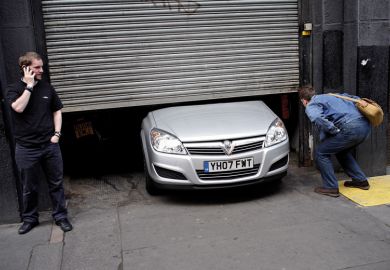What is the European Union? It has been called many things over the past few months, but at least in terms of its budget, it is more or less a system that takes from rich member states and redistributes money to poorer ones.
In 2014, for example, the biggest contributor was Germany, which paid in €25.8 billion (£21.48 billion) and got out €11.5 billion. The biggest beneficiary was Poland, which received €17.4 billion for a €3.5 billion contribution.
But one area where the reverse applies is research. Funds are competitively distributed by the European Research Council (ERC) on the basis of “excellence”, meaning that countries with advanced research systems such as Germany and the UK do very well at the expense of weaker countries in Eastern Europe, for example (see table, below).
Yet with the UK heading for the exit door, there are now fears that this emphasis on excellence may be watered down in favour of a more redistributive approach. This means that even if British universities do manage to remain part of future EU research framework programmes, the rules could nonetheless shift in an unfavourable direction.
“The uneven distribution of ERC funding between the newer accession states [mainly those in Eastern Europe] and the older ones has been an ongoing concern,” said Dame Athene Donald, master of Churchill College, Cambridge, and a member of the ERC’s Scientific Council.
She pointed out that the ERC has a working group, “Widening European Participation”, which, according to its remit, seeks to strengthen the “participation of researchers...from Europe’s less research-performing regions”.
Some in the UK are already nervously stressing that excellence needs to remain a guiding principle.
Jo Johnson, who has now been reappointed universities and science minister, told MPs on the House of Commons Science and Technology Committee on 13 July that it was important that Europe continued “funding science on the basis of excellence”.
Stuart Pritchard, EU affairs manager at the Wellcome Trust, told the committee a week previously that “at the moment, Horizon 2020 [the EU’s current research framework programme] funding is delivered on the basis of excellence. Will that change? We need to be thinking ahead to what could happen potentially.”
Given this prospect, one of the key questions in Brexit negotiations is how much power the UK might have over the criteria by which EU research grants are distributed.
One option on the table is “associate country” status, enjoyed by 15 states including Turkey, Israel and Norway – although in reality they do not share one uniform model of access and influence.
“Both Israel (in the past) and Norway (currently) have had members on the ERC Scientific Council. All members of the council can influence the strategy of the ERC,” said Dame Athene. She also added that right from the foundation of the ERC, “excellence has been the sole criterion for the award of grants”.
However, some suggest that to ensure this continues, the UK will have to negotiate a weightier position than any associate country currently enjoys.
“At the moment the associate countries do not have the influence in setting forward the agenda in the future, and that is why I think it is incredibly important that our preferred model should be an enhanced model to that which exists at the moment,” Sir Ian Diamond, vice-chancellor of the University of Aberdeen, told the committee on 5 July.
“We need to negotiate a far stronger position with the EU than just an ‘associate membership’ status,” Chris Green, Conservative MP for Bolton West and a member of the Science and Technology committee, told Times Higher Education.
How European countries fare in terms of research grants
| Country | Total EU competitive grants per researcher, 2006-2015 inclusive (£) |
| Netherlands | 57,981 |
| Republic of Ireland | 55,942 |
| Switzerland | 45,010 |
| UK | 31,621 |
| Germany | 22,801 |
| Estonia | 15,530 |
| Hungary | 9,170 |
| Poland | 4,858 |
| Bulgaria | 2,217 |
| Slovakia | 3,057 |
Source: Digital Science
POSTSCRIPT:
Print headline: Fears Brexit could skew EU research ‘excellence’ focus
Register to continue
Why register?
- Registration is free and only takes a moment
- Once registered, you can read 3 articles a month
- Sign up for our newsletter
Subscribe
Or subscribe for unlimited access to:
- Unlimited access to news, views, insights & reviews
- Digital editions
- Digital access to THE’s university and college rankings analysis
Already registered or a current subscriber?







